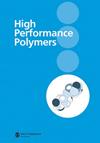Friction and wear characteristics of synthetic diamond and graphene-filled polyether ether ketone composites
IF 1.6
4区 化学
Q3 POLYMER SCIENCE
引用次数: 4
Abstract
Modifying tribo films using filler particles is a significant area of research in developing polymer-based tribo components to minimize material loss during the sliding process. This study focused on altering the wear characteristics of a polyetheretherketone (PEEK)/graphene high-performance polymer composite to strengthen the tribo film by adding synthetic diamond particles. The hot-pressed PEEK composite reinforced by graphene and diamond particles increased the hardness and thermal stability of the composite. Compared with pure PEEK, composites containing 1% graphene and 1% diamond particles showed an increment of 25% and 23% in hardness and thermal stability, respectively. Fourier-transform infrared spectroscopy and X-ray diffraction analysis verified the compatibility and intactness of the fillers in the PEEK matrix. The tribo properties of PEEK composites were characterized by a pin-on-disc tribometer on a counter steel surface. A PEEK composite containing 0.75 wt% graphene and 0.5 wt% diamond particles exhibited the lowest friction of 0.17 at a pressure of 1.5 MPa. The specific wear rate was low (1.78 × 10−6 mm3/Nm) for the composite containing 1 wt% graphene and 1 wt% diamond particles at a pressure of 1.5 MPa. Varying synthetic diamond and graphene filler concentrations in the PEEK matrix change the wear process by modifying the tribo film characteristics, revealing the lowest friction and wear rate. X-ray photoelectron and Raman spectroscopy show that the polymer film was transferred to the steel countersurface, and the tribo-chemical products of the tribo film contribute to a stable tribo film. The ferric oxide film and the tribo film improve the composite’s self-lubricating properties and load-bearing ability. Hence, the composite containing 0.75% of graphene and 0.5% of a synthetic diamond can be employed in the sliding bearing application of continuous conveyors used in mass production systems.合成金刚石和石墨烯填充聚醚醚酮复合材料的摩擦磨损特性
使用填充颗粒修饰摩擦膜是开发聚合物基摩擦组件的重要研究领域,以最大限度地减少滑动过程中的材料损失。本研究的重点是通过添加合成金刚石颗粒来改变聚醚醚酮(PEEK)/石墨烯高性能聚合物复合材料的磨损特性,以增强摩擦膜。石墨烯和金刚石颗粒增强的热压PEEK复合材料提高了复合材料的硬度和热稳定性。与纯PEEK相比,含有1%石墨烯和1%金刚石颗粒的复合材料的硬度和热稳定性分别提高了25%和23%。傅里叶变换红外光谱和x射线衍射分析验证了填料在PEEK基体中的相容性和完整性。用针盘式摩擦计对PEEK复合材料的摩擦性能进行了表征。含有0.75 wt%石墨烯和0.5 wt%金刚石颗粒的PEEK复合材料在1.5 MPa压力下的摩擦最小,为0.17。在1.5 MPa的压力下,含有1 wt%石墨烯和1 wt%金刚石颗粒的复合材料的比磨损率较低(1.78 × 10−6 mm3/Nm)。PEEK基体中不同浓度的人造金刚石和石墨烯填料通过改变摩擦膜的特性来改变磨损过程,从而显示出最低的摩擦和磨损率。x射线光电子和拉曼光谱分析表明,聚合物薄膜被转移到钢表面,摩擦膜的摩擦化学产物有助于形成稳定的摩擦膜。氧化铁膜和摩擦膜提高了复合材料的自润滑性能和承载能力。因此,含有0.75%石墨烯和0.5%合成金刚石的复合材料可用于大规模生产系统中连续输送机的滑动轴承应用。
本文章由计算机程序翻译,如有差异,请以英文原文为准。
求助全文
约1分钟内获得全文
求助全文
来源期刊

High Performance Polymers
化学-高分子科学
CiteScore
4.20
自引率
14.30%
发文量
106
审稿时长
1.2 months
期刊介绍:
Health Services Management Research (HSMR) is an authoritative international peer-reviewed journal which publishes theoretically and empirically rigorous research on questions of enduring interest to health-care organizations and systems throughout the world. Examining the real issues confronting health services management, it provides an independent view and cutting edge evidence-based research to guide policy-making and management decision-making. HSMR aims to be a forum serving an international community of academics and researchers on the one hand and healthcare managers, executives, policymakers and clinicians and all health professionals on the other. HSMR wants to make a substantial contribution to both research and managerial practice, with particular emphasis placed on publishing studies which offer actionable findings and on promoting knowledge mobilisation toward theoretical advances. All papers are expected to be of interest and relevance to an international audience. HSMR aims at enhance communication between academics and practitioners concerned with developing, implementing, and analysing health management issues, reforms and innovations primarily in European health systems and in all countries with developed health systems. Papers can report research undertaken in a single country, but they need to locate and explain their findings in an international context, and in international literature.
 求助内容:
求助内容: 应助结果提醒方式:
应助结果提醒方式:


